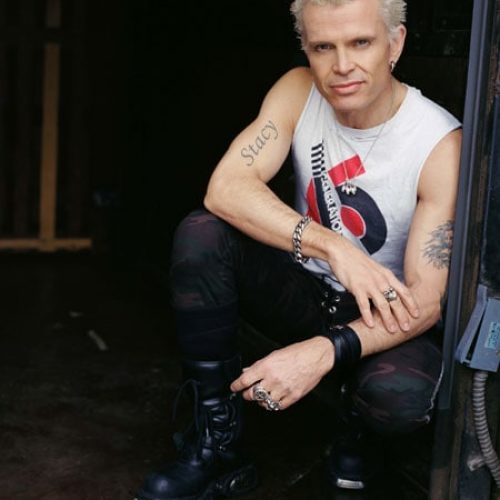Home - Artists - $350,000-$750,000 - Billy Idol
Book Billy Idol

Imagine Billy Idol Headlining Your Event!
The staff of Headline Booking Group will work with you to produce a flawless and memorable event. Get started now by filling out our no-obligation Artist Request Form.
Biography
Billy Idol Biography
Along with Duran Duran, Billy Idol was one the first pop/rock artists to achieve massive success in the early '80s due to a then brand-new U.S. television network, MTV. Mixing his bad-boy good looks with an appealing blend of pop hooks, punk attitude, and a dance beats, Idol quickly rocketed to stardom. Born William Michael Albert Broad in Middlesex, England, the youngster relocated with his family for a brief spell to New York, before returning back to England. After a stint at Sussex University only last a year, Broad found himself as part of a group of teen punk rockers who befriended and followed the Sex Pistols, known as 'the Bromley Contingent' (a member of this colorful group of characters was Siouxsie Sioux, eventual leader of Siouxsie & the Banshees).
Along with Duran Duran, Billy Idol was one the first pop/rock artists to achieve massive success in the early ’80s due to a then brand-new U.S. television network, MTV. Mixing his bad-boy good looks with an appealing blend of pop hooks, punk attitude, and a dance beats, Idol quickly rocketed to stardom. Born William Michael Albert Broad in Middlesex, England, the youngster relocated with his family for a brief spell to New York, before returning back to England. After a stint at Sussex University only last a year, Broad found himself as part of a group of teen punk rockers who befriended and followed the Sex Pistols, known as ‘the Bromley Contingent’ (a member of this colorful group of characters was Siouxsie Sioux, eventual leader of Siouxsie & the Banshees).
Expand Full Bio
It wasn't long before Broad realized that he too could be the frontman of a punk band, and assumed the name Billy Idol shortly thereafter. After a stint playing guitar in a group called Chelsea didn't pan out (interestingly, the group featured future Clash guitarist Mick Jones and future Damned guitarist Brian James), Idol put down the guitar and picked up the mic, and recruited bassist Tony James, drummer John Towe, and guitarist Bob Andrews, forming Generation X in 1976. Named after a 1960s paperback book, the band signed a recording contract with Chrysalis shortly thereafter (Towe was replaced with new skinsman Mark Laff) -- resulting in such releases as 1978's self-titled debut, 1979's Valley of the Dolls, and 1981's Kiss Me Deadly -- before splitting up. Disappointed with Generation X's demise, Idol relocated to New York City, where he pursued a career as a solo artist,. Hooking up with Kiss manager Bill Aucoin, Idol issued the 1981 EP Don't Stop (comprised of a cover of Tommy James' '60s hit 'Mony Mony' and a pair of remixed Generation X tracks), which helped the singer score another record deal with his former band's label, Chrysalis. Idol found the perfect collaborator and partner in guitarist/Johnny Thunders look-alike Steve Stevens, and issued a self-titled debut in July of 1982. A pair of eye-catching videos for the tracks 'White Wedding' and 'Dancing With Myself' (the latter a remake of a Generation X composition) scored major air time on MTV, with both clips focusing in on Idol's spiky, peroxide blonde hair and Elvis-like sneer. The debut eventually obtained gold certification, and set the stage perfectly for Idol's big commercial breakthrough, 1984's Rebel Yell. Rebel Yell became the singer's best-selling album of his career (eventually going double platinum), spawning such big-time MTV/radio hits as the album's anthemic title track, 'Eyes Without a Face,' and 'Flesh for Fantasy,' establishing Idol as an arena headliner stateside. 1987's Whiplash Smile was another sizeable hit on the strength of such hits as 'To Be a Lover' and 'Sweet Sixteen,'. Idol's next release, 1990's Charmed Life, the singer was involved in a serious motorcycle accident (in which he almost lost his leg), forcing the singer to walk with a cane for a period of time; the video for the album's lead-off single, 'Cradle of Love,' featured the singer filmed from the waist up. The ploy worked, as the single (which was also used as the theme song in the Andrew 'Dice' Clay movie, Ford Fairlane) was another smash hit, making Charmed Life the fourth Idol album in a row to achieve at least reach platinum sales. In 1998, he made a cameo appearance (as himself) in the hit Adam Sandler/Drew Barrymore comedy The Wedding Singer, which resulted in renewed interest.
It wasn’t long before Broad realized that he too could be the frontman of a punk band, and assumed the name Billy Idol shortly thereafter. After a stint playing guitar in a group called Chelsea didn’t pan out (interestingly, the group featured future Clash guitarist Mick Jones and future Damned guitarist Brian James), Idol put down the guitar and picked up the mic, and recruited bassist Tony James, drummer John Towe, and guitarist Bob Andrews, forming Generation X in 1976. Named after a 1960s paperback book, the band signed a recording contract with Chrysalis shortly thereafter (Towe was replaced with new skinsman Mark Laff) — resulting in such releases as 1978’s self-titled debut, 1979’s Valley of the Dolls, and 1981’s Kiss Me Deadly — before splitting up. Disappointed with Generation X’s demise, Idol relocated to New York City, where he pursued a career as a solo artist,. Hooking up with Kiss manager Bill Aucoin, Idol issued the 1981 EP Don’t Stop (comprised of a cover of Tommy James’ ’60s hit ‘Mony Mony’ and a pair of remixed Generation X tracks), which helped the singer score another record deal with his former band’s label, Chrysalis. Idol found the perfect collaborator and partner in guitarist/Johnny Thunders look-alike Steve Stevens, and issued a self-titled debut in July of 1982. A pair of eye-catching videos for the tracks ‘White Wedding’ and ‘Dancing With Myself’ (the latter a remake of a Generation X composition) scored major air time on MTV, with both clips focusing in on Idol’s spiky, peroxide blonde hair and Elvis-like sneer. The debut eventually obtained gold certification, and set the stage perfectly for Idol’s big commercial breakthrough, 1984’s Rebel Yell. Rebel Yell became the singer’s best-selling album of his career (eventually going double platinum), spawning such big-time MTV/radio hits as the album’s anthemic title track, ‘Eyes Without a Face,’ and ‘Flesh for Fantasy,’ establishing Idol as an arena headliner stateside. 1987’s Whiplash Smile was another sizeable hit on the strength of such hits as ‘To Be a Lover’ and ‘Sweet Sixteen,’. Idol’s next release, 1990’s Charmed Life, the singer was involved in a serious motorcycle accident (in which he almost lost his leg), forcing the singer to walk with a cane for a period of time; the video for the album’s lead-off single, ‘Cradle of Love,’ featured the singer filmed from the waist up. The ploy worked, as the single (which was also used as the theme song in the Andrew ‘Dice’ Clay movie, Ford Fairlane) was another smash hit, making Charmed Life the fourth Idol album in a row to achieve at least reach platinum sales. In 1998, he made a cameo appearance (as himself) in the hit Adam Sandler/Drew Barrymore comedy The Wedding Singer, which resulted in renewed interest.
Billy Idol Booking Request Form
Please fill out the form below. One of our booking agents will contact you within 24 hours to discuss your event in greater detail.
Our Services Include

Comprehensive needs assessment

Contacting and negotiating with celebrity talent representation


Serving as a liaison between your staff and the artist ensuring a flawless performance

You also might like

Rock

Rock

Rock

Rock

Rock

Rock

Rock

Rock

Rock

Rock
The Headline Booking Promise
At Headline Booking, we deliver unforgettable celebrity entertainment performances for private parties that create lasting impressions and lifelong memories. Our promise is a Gold Standard of service, so you can relax and enjoy the show while trusting that every detail will be executed flawlessly. When you choose Headline Booking, we provide:
Booking of your favorite A-list artist to perform at your private event
Contracting with the artist and coordination of all Artist travel logistics
Our staff to advance all details with you specific to your event
A professional on-site production team overseeing all concert details delivering a seamless experience to be enjoyed by all
